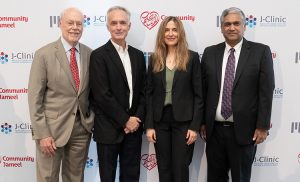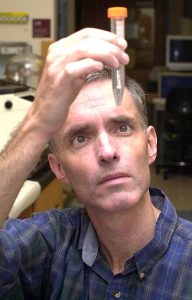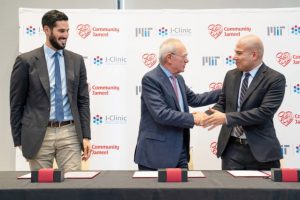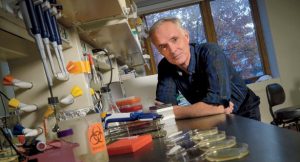Driving progress through partnerships
A Q&A with Prof. James J. Collins, newly appointed special advisor to Abdul Latif Jameel Health
As part of its mission to improve accessibility to high quality healthcare around the world, Abdul Latif Jameel Health is continually looking to forge partnerships with the leading organizations, researchers innovators and thinkers in the global biotech and health industries.
In May 2021, it appointed Professor James J. Collins as a special advisor. James is the Termeer Professor of Medical Engineering & Science in the Institute for Medical Engineering & Science (IMES) and Department of Biological Engineering at the Massachusetts Institute of Technology (MIT).
His innovative research group works in synthetic and systems biology, developing novel and pioneering ways to ‘reprogram’ organisms, including bacteria, to perform targeted tasks, such as detecting and treating infections. This may lead to cheaper drugs, rapid diagnostic tests, and more effective treatments for antibiotic-resistant infections and a range of complex diseases.

Along with MIT colleague Regina Barzilay, James is a faculty co-lead of the Abdul Latif Jameel Clinic for Machine Learning in Health, (Jameel Clinic) at MIT since its founding in 2018.
We spoke to Professor Collins about his research, his new role at Abdul Latif Jameel Health, and his vision for the future of global healthcare.
Could you provide a brief overview of your current work?
I am the Termeer Professor of Medical Engineering and Science in the Institute for Medical Engineering and Science as well as the Department of Biological Engineering. I am also co-faculty lead of the Jameel Clinic, which was established with a generous gift from Mohammed Jameel and his family to serve as a nexus point for efforts at MIT focused on applying AI to the challenges of healthcare.
In addition to my position at MIT, I am also a founding core faculty member of the Wyss Institute at Harvard and an Institute Member at the Broad Institute of MIT and Harvard. My lab primarily focuses on two areas: synthetic biology and antibiotics research, two areas that are increasingly tapping into the potential of AI to advance our knowledge and capabilities.
When did you first become aware of Abdul Latif Jameel Health?
I quickly became connected with Mohammed Jameel and the Jameel Family, together with Community Jameel, and their broader interests in translational healthcare research. It was probably within a year of my involvement with the Jameel Clinic that I became aware of Abdul Latif Jameel Health more specifically. Its mission resonates closely with my own approach. I was delighted to be asked to join as an advisor. My role is primarily to help Abdul Latif Jameel Health evaluate exciting opportunities for either investment or partnerships, such as the recent link-ups with Evelo Biosciences and Cellarity.
What do you see as the biggest challenges facing global healthcare currently?
 Most people think of global health challenges as being exclusively around infectious diseases. In my own field, we work in infectious diseases, particularly antibiotics and increasingly now antivirals as a result of the COVID-19 pandemic. But an under-appreciated aspect is that developing countries are also saddled with major challenges around non-infectious diseases, including cancer and nerve degenerative conditions.
Most people think of global health challenges as being exclusively around infectious diseases. In my own field, we work in infectious diseases, particularly antibiotics and increasingly now antivirals as a result of the COVID-19 pandemic. But an under-appreciated aspect is that developing countries are also saddled with major challenges around non-infectious diseases, including cancer and nerve degenerative conditions.
So, the bigger challenge is how to make the marvelous advances that we are seeing in both infectious and non-infectious diseases affordable and accessible to everybody.
Traditionally, most of the effort around global public health has been in the non-profit sphere. One of the missions of Abdul Latif Jameel Health is to see how it can be achieved from a for-profit perspective, leveraging the ability of market forces and market encouragement to drive meaningful change.
At a personal level, many of my interests are in infectious disease, but we are increasingly looking to see how various tools from AI and synthetic biology can address other more complex diseases and may lend themselves well to addressing broader health challenges around the globe.
Could you provide some examples of how technologies like AI, big data and machine learning are advancing innovation on healthcare?

Photo Credit © courtesy Collins Lab at MIT
If we take antibiotics first, as part of the Jameel Clinic, Regina Barzilay, Tommi Jaakkola and myself collaborated to see if we could harness the power of AI to address the antibiotic resistance crisis. We were able to advance a pilot effort where we trained an AI model to help us identify a potent new antibiotic called Halicin that was very effective against a broad range of pathogens, including multi-drug resistant, extensively drug-resistant and pan-resistant pathogens.
We were subsequently able to apply the model to an enormous library of 1.5 billion molecules in just a few days, identifying a large number of other new antibiotic candidates.
We have now launched the Antibiotics-AI project at MIT through the Jameel Clinic, with the goal of using AI to design and discover a novel class of antibiotics, as we did with Halicin.
On the synthetic biology side, we have previously established that you can use engineered synthetic gene circuits along with cell-free extracts. In the case of cell-free systems, you can open up a living cell and take the ‘machinery’ out of that cell. Our advance was to show you could freeze-dry these cell-free extract along with synthetic biology gene circuits onto paper in order to create inexpensive paper based diagnostics.
Perhaps most stunningly, in the midst of the COVID-19 pandemic and under the auspices of the Jameel Clinic, in part, we showed we could use synthetic biology to create a COVID-19 facemask diagnostic that could give an output in a relatively few minutes with high sensitivity and high specificity to SARS-CoV-2. In short, a facemask which could tell you if you had COVID-19.
How close to commercialization are these advances?
With Halicin, we are now advancing it further towards a potential clinical trial; exploring its toxicity, developing analogues to address the toxicity, and scoping out additional aspects of its drug-like properties.
With regard to the paper-based diagnostic, we have a spinout from MIT, Sherlock Biosciences, which has developed an FDA-approved COVID-19 diagnostic based on our synthetic biology platform. This has now been adopted by multiple global diagnostic firms, as well as the country of Nepal as their national test. Sherlock Biosciences and its partners are now on pace to use our technology to conduct 10M COVID-19 diagnostic tests each month in countries around the globe.
The diagnostic facemask is still at the academic stage. It is not yet commercialized, but it is an interesting opportunity to explore as to how could we move this from a lab demo at MIT and the Wyss Institute to a product that might be available at your local pharmacy.
How important is it to make sure that innovations like these get out into the whole world and don’t only become healthcare for wealthy nations?
It is an important part of my mission as a professor and an entrepreneur to try and ensure that our technologies are available to all. We too often see companies that are driven for profit over impact, particularly in the US. For me, impact is much more important than profit. I would much rather see a product that benefits millions of individuals than make millions of dollars off the product.
Has the COVID-19 pandemic encouraged people to think more about this aspect?
It has, but not as much as it should. Greed is unfortunately a very powerful force in this world.
 This is why, through Sherlock Biosciences, we have established a foundation called The 221b Foundation, named after Sherlock Holmes’ fictional address in London.
This is why, through Sherlock Biosciences, we have established a foundation called The 221b Foundation, named after Sherlock Holmes’ fictional address in London.
We have committed to donating all profits from our COVID-19 product to the foundation, as well as making all our IP around CRISPR diagnostics available to any organization that would like to develop COVID-19 diagnostics, on the understanding that the profits need to come back to the foundation.
These profits are then dedicated to advancing STEM (Science, Technology, Engineering and Mathematics) efforts for under-represented minorities, trying to encourage more young people to study STEM subjects, to advance technologies and to address global health challenges.
How is the Jameel Clinic as a whole helping to address some of these issues?

The Jameel Clinic was formed approximately three years ago [2018], and it has been thriving since then, with a number of exciting programs underway.
In the midst of the pandemic, the Clinic launched a program called AI Cures, which aims to advance AI to address emerging pathogens, including SARS-CoV-2. As part of this initiative, we were able to pull together a number of interesting datasets that were made accessible to researchers around the world.
Working with Regina Barzilay and Tommi Jaakkola and a number of their graduate students, we were also able to use AI, for example, to develop effective combinations for treating SARS-CoV-2, the pathogen that causes COVID-19.
What is it about AI, big data and machine learning that makes them such gamechangers in healthcare innovation?
The key aspect to AI and big data is that these resources enable us to embrace the complexity of biology and chemistry at a scale well beyond anything our brains alone could achieve.
 Even the simplest of living cells, bacteria, are much more complicated than the most complicated machine we have ever designed on Earth. It is effectively impossible to comprehensively understand how such a living system evolved over the course of billions of years.
Even the simplest of living cells, bacteria, are much more complicated than the most complicated machine we have ever designed on Earth. It is effectively impossible to comprehensively understand how such a living system evolved over the course of billions of years.
Similarly, it is incredibly difficult to understand how a drug that we are developing could affect the complex biology of a living cell or set of cells. Big data and AI enable us to do that. We can use these technologies to query the biology of a living cell at a scale that we previously could not. It enables us to understand the interaction between molecules to generate better insights into how all these amazing components in a living cell interact to create a healthy state and how they might break down in their interactions to create a disease state. This allows us to identify how we could potentially intervene to correct or improve upon a diseased or injured state.
Is the potential of these technologies yet fully understood?
Not at all, we are still very early days in applying AI to challenges in health care. We have seen AI and big data have a huge impact in the information world and the internet, but in the fields of biology and medicine, the age of big data is still in its infancy. I think we will see increasing advancements in the next decade or two as more and more data are collected and made available. One of our missions at the Jameel Clinic is to train the next generation of healthcare researchers to be multi-disciplinary, so they have expertise in both AI/machine learning and in biology and chemistry, allowing them to work at the interface of technology, science and medicine to make breakthroughs that matter for patients.
Looking ahead, what do you think the medium-to-longer-term future of global health care looks like?
I think one of the few advantages of the pandemic is a growing awareness among young people of the importance of infectious disease as a serious issue worthy of their attention. So, I think we will see more young talent coming into the field of infectious diseases and global health, which will certainly advance our knowledge and our abilities to detect, treat and prevent infections.
Looking ahead, we will certainly see dramatic, impressive changes and advances in biomedicine. We will see the growing impact of big data, advanced technologies including AI and synthetic biology, to advance efforts that enable us to better diagnose disease, treat disease, and prevent disease across the globe, in a way that is economically efficient and hopefully affordable to all.





 1x
1x

 Added to press kit
Added to press kit


